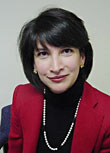Q&A With Rabia de Lande Long: Developing Confidence in the Ability to Lead

Most businesses will be happy to turn the calendar to 2003. A difficult economic environment, fallout from major corporate disasters, and an unsettled political climate in some of the world's most sensitive regions have all conspired to make 2002 a year many executives would like to put behind them.
As businesses look ahead to 2003, what steps are they taking to develop the organizational leadership they need to grow? Addressing this issue is Rabia de Lande Long, leader of WJM Associates' organizational effectiveness practice. Rabia collaborates with clients to improve organizational effectiveness by aligning business strategy, processes, structure, and people. Many of her engagements involve post-merger integration, restructuring, culture change, team building, and leadership development. She earned a BA in psychology from the University of Virginia and an MBA focused on marketing and organizational behavior from Yale University.
Q. What are companies doing these days to become more effective?
More companies are focusing on leadership and talent-planning issues. They're making sure they have the right people in the right roles with the right capabilities to make good decisions that will lead companies forward.
Many organizations have spent a lot of time and money to develop their strategies. However, many of these strategies are quite similar -- to be the best at this or the best at that. At the end of the day, what will differentiate the successful companies will be the people who are implementing their strategies and plans. As a result, we are seeing more investment in human capital, especially at the upper levels of companies.
Q. Why now?
Partly because things are a bit tougher now. In the Eighties, things were "go-go"; in the Nineties, things became a little more realistic. And now, with so much uncertainty in the marketplace, when companies spend a dollar, each dollar has to count.
Businesses are looking at investments more critically now. They want to make sure they're spending their dollars more wisely and deploying resources as effectively as possible.
Q. Is there any particular dimension of human capital that organizations are addressing?
Companies are looking to exceed expectations. They realize that their people may not have all of the capabilities required to do this. So we are delivering work that defines "success factors" -- what successful people do more often and better than everyone else. Instead of going to a poorly lit and ventilated training room, companies are saying, "Let's build dynamic, experiential and sustaining learning programs that will foster the thought processes, decision making and execution that will differentiate us in the marketplace."
Remember, at a certain level, all managers are competent technically. What differentiates top performers is their emotional intelligence -- their ability to work with people, to communicate, to motivate, to inspire, to deal with conflicts. We can help companies identify what their people need to do to build capability and competence.
Q. What makes a company or a leader a good candidate for this investment? What do you look for besides technical knowledge?
To identify high-potential people who will be good coaching candidates, start with someone who is technically strong, but has something that could keep them from going to the next level or achieving their business objectives. The issue might be as simple as polishing their presentation skills, or it could be as complex as improving how they deal with conflict.
Organizational issues are different. Many companies find that there are barriers to good performance: it may be process, structure, technology, or people. We can help them identify the gaps and collaborate to develop action plans to address those areas. We are doing a lot of work in the area of change management now. We can help companies think through how to apply static amounts of resources against the right priorities.
Q. Looking ahead to 2003, do you think more companies will begin to hire, now that they've gone through a period of downsizing and restructuring, in addition to making these organizational investments that you've described?
Unfortunately, no. I'm seeing head count being held level or being cut back, and I expect to see the use of contingent resources, either temporary employees or consultants, to fill those gaps. That way, companies are not increasing their fixed costs, but can still meet expectations.
Join our newsletter
Stay up to date on all things happening at WJM Associates



